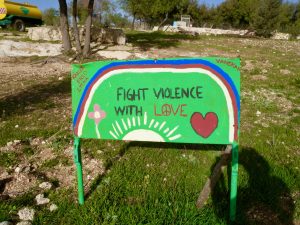HOMILY WEEKDAY 23 04 – Year II
The Heart of Christian Living
(1 Cor 8:1b-7, 11-13; Ps 139; Lk 6:27-38)
************************************************************
A woman died and arrived at the Gates of Heaven. Saint Peter told her she had to spell a word to get in. “Which word?” the woman asked. “Love,” he replied. The woman spelled “Love” and Saint Peter welcomed her into Heaven. About six months later, Saint Peter asked her to watch the Gates of Heaven for him. Suddenly her husband arrived. “What are you doing here?” she asked. “I’m a bit embarrassed,” her husband told her. “I fell in love with and married the beautiful young nurse who took care of you while you were ill. I won the lottery and bought a big mansion. My wife and I travelled around the world. We then went skiing, I fell, hit my head on a rock, and here I am. How do I get in?” “You have to spell a word”, the woman told him. “Which word?” her husband asked. “Czechoslovakia,” she replied.
The gospel of Luke today sums up the core of Christian life with five distinct teachings: love our enemies; live the Golden Rule, be merciful, do not judge, and forgive our abusers.
The best way to love our enemies is to forgive them from the heart, and pray for their wellbeing. The Golden Rule is to treat others the way we would want them to treat us. We are to put on the heart of God and be as merciful as our heavenly Father is merciful. We are to refrain from judging others by especially trying to understand them and where they are coming from. Finally, we are to forgive anyone who has hurt us in any way. All of this boils down to loving others as God in Jesus has loved us.
Traditionally, there are four kinds of love: eros, or romantic love; storge, or collegial love, filia or friendship love, and agape, or deep, profound, unselfish, unconditional love Christ showed us by his life, death and resurrection. It is especially to this kind of love we are called. The highest form of this love is to love our enemies.
Jesus actually teaches us to love in five different ways: love God with our whole being, love our neighbour, love ourselves, love one another as he has loved us, and finally, love our enemies.

Tent of the Nations welcome sign
An example of this kind of love is the Tent of the Nations in Israel near Jerusalem. A Palestinian Christian family, persecuted and oppressed by the Jewish settlers all around them, their mottos are: “We refuse to be enemies” and “We refuse to hate.” This despite not being allowed running water (they collect rain water); electricity (they use solar power) nor building permits (they live and work in caves). They are truly living the teaching of Jesus, “Love your enemies.”
The essence of forgiveness is to take in negative energy directed towards one’s self, hold it, not respond in kind, pray about it and then give it back to the offender with love, letting go of any desire for revenge or getting even. This is what Jesus did on the Cross, and what Mary was doing at the foot of the Cross. “Father, forgive them, they know not what they do.” It is to this forgiveness we are called by our baptism into Jesus Christ.
An example of this kind of forgiveness is Paula D’Arcy, who was able to forgive the drunk driver who killed her husband and five-year-old daughter, despite the fact he lied in court and showed no sign of remorse. The parents of one of the victims of the Humbolt Broncos hockey team bus crash also issued a statement extending forgiveness to the truck driver who caused the deadly and tragic crash. This truly is living today’s gospel.
Lastly, we are not to judge anyone. How can we possibly know what the other person has been through, what their story is? To understand the other is to forgive the other. Personally, when I was finally able to understand my father, after a fifteen-year struggle of trying to change him, I found all my anger and bitterness disappeared instantly. I was able to go home and be reconciled with my father – a life-changing event I wrote about in the book Walk A New Path. Incidentally, that experience must have struck a chord with people, as that story was carried by two Catholic newspapers at the time, the Western Catholic Reporter and the Prairie Messenger. It also appeared in the June 2018 edition of the Living With Christ.
The Eucharist empowers us to live these major teachings of Jesus, because we are joined to and sharing in the love of him who was the mercy of the Father in the flesh, taught the Golden Rule, loved his enemies, forgave them, and did not judge them. Let us strive to do the same, as did all the saints.



